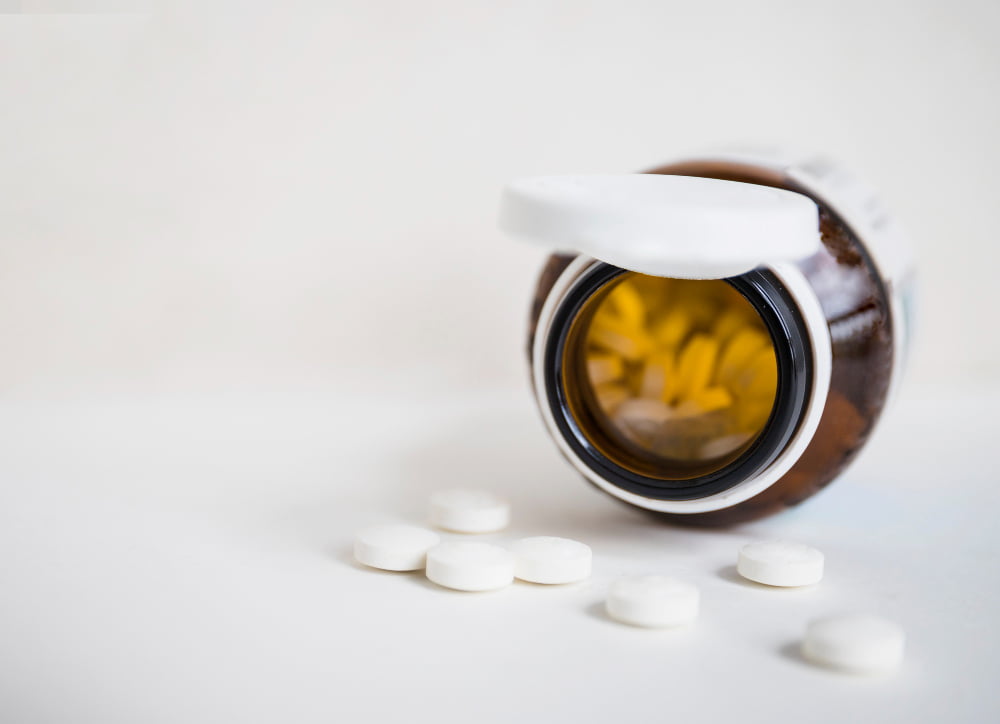FREE SHIPPING OVER $50
Caffeine Pills 101: Elevate Energy and Ignite Weight Loss
Caffeine pills are supplements that contain a concentrated dose of caffeine, the same substance that is found in coffee, tea, energy drinks, and chocolate. Caffeine is a natural stimulant that can enhance your physical and mental performance, as well as your mood and motivation.
But are caffeine pills safe? How do they work? What are the benefits and side effects of caffeine pills? And are there any alternatives for caffeine pills that can offer similar or better results? In this article, we will answer all these questions and more, so you can decide if caffeine pills are right for you.
What are Caffeine Pills?

Caffeine pills are capsules or tablets that contain pure or synthetic caffeine, usually ranging from 100 to 200 milligrams per pill. That’s equivalent to about one to two cups of coffee, depending on the strength and type of brew. Caffeine pills are sold over-the-counter in most pharmacies, health stores, and online retailers. They are often marketed as alertness aids, energy boosters, weight loss supplements, or pre-workout enhancers.
How do caffeine pills work?
Caffeine works by blocking the effects of adenosine, a chemical that builds up in your brain throughout the day and makes you feel sleepy and tired. By blocking adenosine, caffeine increases the activity of other neurotransmitters, such as dopamine, norepinephrine, and acetylcholine, that can improve your mood, memory, attention, reaction time, and alertness. Caffeine also stimulates your central nervous system, which can increase your heart rate, blood pressure, breathing rate, and metabolism. This can make you feel more energetic, alert, and ready for action.
Benefits
Caffeine pills can offer several benefits for your health and performance, such as:
- Elevating your energy levels: Caffeine can help you overcome fatigue and lethargy, especially when you are sleep-deprived or under stress. Caffeine can also help you stay awake and alert during long or boring tasks, such as driving, studying, or working.
- Enhancing your cognitive abilities: Caffeine can improve your mental functions, such as memory, concentration, learning, problem-solving, and creativity. Caffeine can also boost your mood and motivation, making you feel more positive and confident.
- Improving your physical performance: Caffeine can increase your strength, endurance, power, speed, and agility. Caffeine can also reduce your perceived exertion and pain during exercise, allowing you to push yourself harder and longer.
- Supporting your weight loss goals: Caffeine can increase your metabolism and fat burning rate by stimulating the breakdown of stored fat and releasing it into the bloodstream as free fatty acids. Caffeine can also suppress your appetite and reduce your calorie intake by making you feel fuller for longer.
Side Effects
Caffeine pills are generally safe when used in moderation and as directed by the label or a doctor. However, caffeine pills can also cause some side effects if you take too much or if you are sensitive to caffeine. Some of the common side effects of caffeine pills include:
- Anxiety: Caffeine can make you feel nervous, jittery, restless, or irritable. Caffeine can also worsen anxiety disorders or panic attacks in some people.
- Insomnia: Caffeine can interfere with your sleep quality and quantity by delaying or preventing the onset of sleep or disrupting your sleep cycles. Caffeine can also cause nightmares or vivid dreams in some people.
- Headache: Caffeine can cause headaches by constricting the blood vessels in your brain or by triggering withdrawal symptoms when you stop taking it.
- Dehydration: Caffeine can cause dehydration by increasing your urine output and sweating rate. Caffeine can also reduce your saliva production and dry out your mouth.
- Stomach upset: Caffeine can cause stomach upset by stimulating the production of gastric acid or by irritating the lining of your stomach or intestines. Caffeine can also cause nausea, vomiting, diarrhea, or constipation in some people.
- Heart problems: Caffeine can cause heart problems by increasing your heart rate, blood pressure, or irregular heartbeat. Caffeine can also interact with some medications or conditions that affect your heart health.
Caffeine Pills for Weight Loss
One of the main reasons why people take caffeine pills is to lose weight. Caffeine pills can help you shed some pounds by increasing your energy expenditure and reducing your calorie intake. Here’s how:
- Boosting your metabolism: Caffeine pills can help you burn more calories even when you’re resting. Studies have shown that caffeine can increase your resting metabolic rate by 3 to 11%, depending on the dose and your response.
- Enhancing your thermogenesis: Caffeine pills can help you generate more heat and sweat, which also burns calories. Research has found that caffeine can increase the thermic effect of food by 10 to 29%, meaning that you use more energy to digest and absorb what you eat.
- Suppressing your appetite: They can also help you eat less and feel fuller for longer. Studies suggest that caffeine can reduce your hunger and increase your satiety, depending on the dose and the time of consumption.
- Improving your performance: They help you exercise harder and longer, which also increases your calorie burn. Studies have indicated that caffeine can enhance your endurance, strength, and your power, depending on the type and intensity of the activity.
How to use caffeine pills safely and effectively
To use caffeine pills safely and effectively, you should follow these tips:
- Start low and go slow: Start with a low dose of caffeine (50 to 100 milligrams) and see how you react. Gradually increase the dose if needed, but do not exceed the recommended daily limit of 400 milligrams for healthy adults.
- Time it right: Take caffeine pills at least three to four hours before bedtime to avoid disrupting your sleep. Avoid taking caffeine pills late in the afternoon or evening, as caffeine can stay in your system for up to six hours or longer.
- Drink plenty of water: Drink at least eight glasses of water per day to stay hydrated and prevent dehydration. Water can also help flush out excess caffeine from your body and reduce its side effects.
- Eat well: Eat a balanced and nutritious diet that includes plenty of fruits, vegetables, whole grains, lean proteins, and healthy fats. Food can help buffer the effects of caffeine on your stomach and provide you with essential nutrients and energy.
- Take breaks: Do not take caffeine pills every day or for prolonged periods of time. Take breaks from caffeine every few days or weeks to avoid building up a tolerance or dependence on it. This can also help prevent withdrawal symptoms, such as headache, fatigue, or mood swings, when you stop taking it.
Alternatives for caffeine pills
Caffeine pills are not the only way to boost your energy and performance. There are some alternatives for caffeine pills that can offer similar or better results, such as:
- Natural sources of caffeine: You can get caffeine from natural sources, such as coffee, tea, cocoa, guarana, yerba mate, or kola nut. These sources can also provide you with antioxidants, flavonoids, polyphenols, and other beneficial compounds that can enhance your health and well-being.
- Other supplements: You can try other supplements that can improve your energy and performance, such as ginseng, rhodiola, ashwagandha, maca, coenzyme Q10, creatine, or beta-alanine. These supplements can also support your immune system, brain function, hormone balance, muscle growth, or recovery.
- Lifestyle changes: You can make some lifestyle changes that can increase your energy and performance naturally, such as getting enough sleep, exercising regularly, managing stress, meditating, or practicing gratitude. These changes can also improve your mood, self-esteem, resilience, or happiness.
Conclusion
Caffeine pills are supplements that contain a concentrated dose of caffeine that can elevate your energy and ignite your weight loss. They can also enhance your cognitive and physical performance by stimulating your brain and body. However, caffeine pills can also cause some side effects if you take too much or if you are sensitive to caffeine. So, you should be able to use caffeine pills safely and effectively by following the tips in this article. You should also consider its alternatives that can offer similar or better results without the risks of caffeine.
If you found this blog post insightful, explore more by delving into our related articles:







